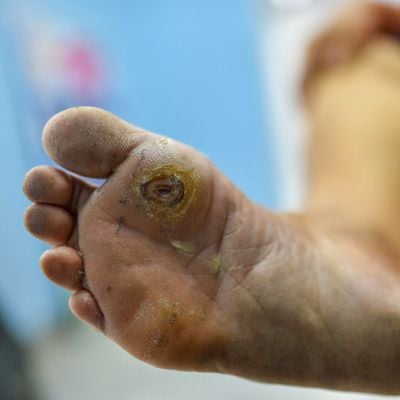 Foot lesions, though often overlooked, can have a significant impact on one's overall foot health. This article aims to provide a detailed exploration of foot lesions, shedding light on their types, causes, symptoms, and the importance of timely diagnosis and treatment.
Foot lesions, though often overlooked, can have a significant impact on one's overall foot health. This article aims to provide a detailed exploration of foot lesions, shedding light on their types, causes, symptoms, and the importance of timely diagnosis and treatment.
Types of Foot Lesions: Unraveling the Diversity
- Ulcers and Open Sores: Exploring the causes behind ulcer formation and the potential complications if left untreated.
- Blisters and Abrasions: Detail the ordinary blisters and abrasions, their causes, and appropriate care.
Causes and Risk Factors for Foot Lesions
- Friction and Pressure Points: Discuss how constant rubbing or pressure can lead to the development of lesions.
- Infections and Fungal Issues: Examining the role of infections and fungal conditions in causing lesions on the foot.
Recognizing Symptoms of Foot Lesions
- Pain and Discomfort: Highlighting how pain or discomfort may indicate the presence of a foot lesion.
- Changes in Skin Color and Texture: Advising readers to be attentive to skin color and texture alterations as potential signs of lesions.
The Impact of Diabetes on Foot Lesions
- Diabetic Foot Lesions: Delving into the specific risks and complications associated with foot lesions in diabetic individuals.
- Neuropathy and Lesion Development: Explaining the connection between neuropathy and the increased vulnerability to foot lesions.
Preventive Measures to Safeguard Against Foot Lesions
- Proper Footwear Choices: Emphasizing the significance of well-fitted, supportive shoes in preventing lesions.
- Regular Foot Inspections: Encouraging readers to conduct routine foot inspections, especially for those with diabetes or circulation issues.
Home Remedies and Care for Foot Lesions
- Cleaning and Dressing Wounds: Offering practical advice on cleaning and dressing minor foot lesions at home.
- Avoiding Self-Treatment Pitfalls: Warning against self-treatment for severe or infected lesions and seeking professional care.
Seeking Professional Help: Diagnosis and Treatment
- Diagnostic Procedures: Explaining standard diagnostic procedures, including visual inspection, imaging, and laboratory tests.
- Treatment Approaches: Discuss various treatment modalities, from topical ointments to surgical interventions, based on the severity of the lesion.
Complications and Long-Term Consequences of Untreated Foot Lesions
- Infections and Sepsis: Outlining the potential complications that may arise from untreated foot lesions, including infections and sepsis.
- Impact on Mobility: Addressing the long-term consequences of foot lesions on an individual's mobility and overall quality of life.
Conclusion
In conclusion, understanding and addressing foot lesions is crucial for maintaining optimal foot health. By being proactive in prevention, recognizing symptoms early, and seeking professional care, individuals can pave the way for healthier, happier, and more comfortable lives. Regular foot care, coupled with a commitment to addressing foot lesions promptly, empowers individuals to take charge of their foot health and enjoy the activities they love without unnecessary hindrances.
Disclaimer:
The information on this website is provided for educational and information purposes only and is not medical advice. Always consult with a licensed medical provider and follow their recommendations regardless of what you read on this website. If you think you are having a medical emergency, dial 911 or go to the nearest emergency room. Links to other third-party websites are provided for your convenience only. If you decide to access any of the third-party websites, you do so entirely at your own risk and subject to the terms of use for those websites. Neither Joseph Stuto, DPM, nor any contributor to this website, makes any representation, express or implied, regarding the information provided on this website or any information you may access on a third-party website using a link. Use of this website does not establish a doctor-patient relationship. If you would like to request an appointment with a health care provider, please call our office at 718-624-7537.


